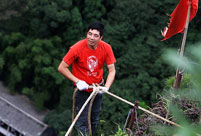 |
| Yang Yongqing (second from left) escorted then premier Zhou Enlai when he visited Shihezi in July 1965. |
Remarkably prosperous
While the cities in the region were looking remarkably prosperous with skyscrapers and cars, life outside the cities was still grim. "In the Kunlun Mountain area, the farmers and farm workers are not hungry all the time like they used to be but that's way below the living standards of the rest of the country. This reinforces how important it is to keep funding and developing the West, and reminds me how far we need to go in order to help Xinjiang catch up with the rest of the nation," he said.
Unlike most of zhiqing, Jiang chose to stay in Xinjiang until retirement instead of returning to Shanghai in the 1980s. He said this was a practical choice. He had married a zhiqing girl in 1972 and they had had a child. His father in Shanghai had died in 1971 and his mother was being cared for by his three older sisters.
"Going back to Shanghai meant starting all over again and this was unrealistic for a man aged over 30. My sisters and their husbands were willing to have me live with them and cover my living expenses, but I couldn't stand relying on other people for shelter and food."
He enjoyed his career in Xinjiang. "It was after I arrived in Xinjiang that the corps (which administered the zhiqing) got me to study medicine and later qualify as a doctor. In Shanghai where there were so many good doctors, I would have been nothing, but over there I was of use and people always came to me where there was a medical emergency. I would have been an extra in Shanghai."
Most of his colleagues at the little clinic he worked in - the physician, the obstetrician and the technician - were also zhiqing but they all left Xinjiang in the early 1980s. At that time some of the villagers were crying as they held his hand and asked whether he would also be leaving them.
"They asked what would they do if they got sick again. With the others gone, I knew the clinic would have to close if I also left. I couldn't bear the thought of that. Although life there was poor and difficult, I believed I had to help people."
On the trip back to Xinjiang, hundreds of Jiang's old patients came to greet him and thank him. Many families had three generations who had been treated by him. "Being remembered like this is satisfying. I feel that this has not been a worthless life," said Jiang.
He said the general feeling in Xinjiang was that the Shanghai zhiqing had brought knowledge, modern civilization, and modern thinking and ideas with them. "We had found our places there and made contributions."


 2013 Colour Me Rad 5K run held in Canada
2013 Colour Me Rad 5K run held in Canada China's destroyer Qingdao sails out of Sydney Harbor
China's destroyer Qingdao sails out of Sydney Harbor Chinese tycoon aims to restore London's Crystal Palace
Chinese tycoon aims to restore London's Crystal Palace Worst flooding hits Yuyao, 70% of downtown area underwater
Worst flooding hits Yuyao, 70% of downtown area underwater Game for the brave: 'Spiders' in Yandang Mountains
Game for the brave: 'Spiders' in Yandang Mountains Hungarian wingsuit flyer confirmed dead in Zhangjiajie
Hungarian wingsuit flyer confirmed dead in Zhangjiajie New couples take wedding photos during holiday
New couples take wedding photos during holiday Serena Williams stumbles through to quarterfinals
Serena Williams stumbles through to quarterfinals Thailand Mobile Expo 2013 kicks off
Thailand Mobile Expo 2013 kicks off Photo collection of Chinese Navy
Photo collection of Chinese Navy Photo story: Young tenants in Beijing
Photo story: Young tenants in Beijing Twins Culture Festival kicks off in Beijing
Twins Culture Festival kicks off in Beijing UNESCO world heritage site: Montale Tower
UNESCO world heritage site: Montale Tower Israeli drone crashes into Mediterranean, fragments recovered
Israeli drone crashes into Mediterranean, fragments recovered Serena Williams wins second China Open title
Serena Williams wins second China Open titleDay|Week|Month